Wouter Van Belle
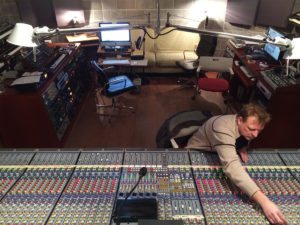
Rooted in Flanders’ great-Mechelen area, Belgian producer, arranger, composer and musician Wouter Van Belle has worked in studios in Brussels, London, Memphis and Paris.
Over the last three decades, Wouter has produced radio classics in Flemish/Dutch, French and English in Belgium, France and Holland. He has produced chart toppers in Belgium, France, the Netherlands, Switzerland and Canada. Artists like Axelle Red, Wigbert, Noordkaap, Gorky, Laïs, Novastar, Flip Kowlier, Yevgueni and Racoon recorded some if not all of their commercially most successful and critically most acclaimed albums with Wouter as a producer. Drawing from his own broad musical interest and using his hands-on talents he has successfully crafted pop, soul, reggae, folk, rock, dance and speedmetal albums.
Wouter Van Belle founded Powertone Publishing in 1992, and is founder and shareholder in the Petrol Music label.
Wouter has a Music diploma from the Mechelen Conservatorium, graduated as an Assistant at the Rits department of the Brussels Erasmushogeschool and has an MA in Music and Music Production from the Gent Hogeschool.
Awards
Belgium
1994 Zamu Award for best producer,
2000 Zamu best album: Novastar – Novastar
2001 Zamu best album Ocharme ik – Flip Kowlier,
2008 MIA Audience Award for best world music act – Laïs
France
1999 Victoire de la Musique: Female artist of the year – Axelle Red
Netherlands
2011 Edison Prize for album Liverpool Rain – Racoon
2012 3FM Awards for Best single – No Mercy – and Best Album -Liverpool Rain.
2012 Buma/Stemra: Racoon – Gouden Harp
2012 Popprijs: Racoon
2013 3FM Awards: Racoon for Best Pop Artist, Best Band, Beste Single – Oceaan
You can download the full biography as an .rtf file , or continue reading:
Sound on sound recording
In 1968, at the age of 4, the organ in A Whiter Shade of Pale caught Wouter’s attention. But his father told him he would have to learn the piano first. 2 years later he got his own AM-radio. He learned his theory through formal music education, but preferred to study the piano on his own. At the age of 10 Wouter got his first recording device: a Philips tape-recorder with the unique function of sound on sound recording! Together with his siblings Wouter used to overdub the vocals on instrumental b-sides of vinyl singles using the ping-pong technique.
By the age of 16, Wouter owned a few Beyer Dynamic microphones and 2 keyboards: a Höhner pianet-T and the polyphonic Casiotone Vl2. During his studies, he started building his own studio in Mechelen and borrowed money to buy an Akai S900 sampler, a Tascam A3340 4-track recorder and the Steinberg PRO24 software. A friend lent him his first mixing console. Among his first paid jobs were making jingles for a local radio station. He played piano with local bands such as Casiopea, Dealwood, and Black Widow. At 18 he joined the soul/R&B cover band The Boxcars. Wouter got to play songs from Otis Redding and Little Feat with the late Jokke Kerkhofs on drums, Luk de Graaff on bass, Lange Polle (currently playing with Triggerfinger) on guitar and Henri Ijlen on sax. With The Boxcars Wouter toured Belgium and played the Marktrock Festival in 1985.
1988-1990 the early years as a studio technician and a mixer
At the end of his compulsory army service in 1988, Wouter did a three month stint working in the KVS theatre, doing the front of house mix for Alice directed by Jean-Pierre De Decker. He had the option to stay on, but chose instead Studio Impuls in Herent, where he had already recorded with producer Jean Blaute for Alice. Impuls featured two 16-track tape recorders synchronized with midi. For Wouter it was studio on weekdays, and live-mixing The Radios in the weekends. Wouter recorded and/or mixed Clouseau (debut album), De Kreuners (Ik wil je), Soulsister (recording the bass line of the international hit The way to your heart) Wim Mertens, Waso. While recording these pop and rock bands, Wouter also started to make a name for himself as a mixer of Belgian New Beat dance music, an underground club genre on the verge of its mainstream breakthrough, which was also to become a major influence on Euro House music. Wouter’s (re)mixes included Rocco Granata’s Marina and the Confetti’s’ C in China.
His productive and successful stay at Impuls ended abruptly when one of the clients wanted to hire him as a producer: the studio owner wouldn’t accept it. Immediately Wouter gets picked up by Wilfried van Baele from Galaxy Studio’s, where he continued to do dance (re)mixes, e.g. B.B. Jerome’s Shock Rock (500.000 ex). Around that time he also remixed Telex’ Moscow Discow and Twist à St-Tropez at Dan Lacksman’s Synsound with Serge Ramaekers. In 1988 Wouter composed and produced the 12″ dance track Dreams- The Rhythm Of My Dreams; it sold well in Germany and ended up on several compilations. But dance proved to be just one of the genres in which Wouter was able to reach broad audiences.
The early 90s: take off as a producer
In 1990 Wouter rented a house with a studio in Mechelen. He bought his own Tascam MSR16 16-track recorder, and again borrowed a mixing console, the Soundcraft 1600 which will become a life long companion. With this setup Wouter developed his own sound: the Soundcraft mixing console sounded great but suffered from limited dynamics and needed to be fed a powerful signal. Wouter achieved this through his miking, EQ and compression: he calls it a slightly overexposed sound or ‘power-tone’. Powertone – the name he gave his company.
The studio instantly became a favorite for demo recordings with bands as the The Radios, Soulsister and Hugo Matthysen. The latter tipped Wouter about a name in the finale of Humo’s Rock Rally: Gorky. Wouter proposes them to record a single with him: Anja. He then pitched the result to Virgin Belgium’s newly installed A&R department, with success.
Two hit singles later -Stone Cold Woman by the B-Tunes and Gorky’s Anja- Wouter invested in a 24-track Otari MTR100, which he synced with his 16-track. Other essentials featured Focus Rite pre-amps and EQ’s, and a Neumann U87 mic. Permanent instruments in Wouter’s studio are a Hammond A100 organ with Leslie and a Yamaha upright. This is the setup with which Wouter will record several classic 90s Belpop songs and albums: Noordkaap – Een Heel Klein Beetje Oorlog, Gorky – Gorky, Wigbert – Ticket In De Nachtkastla. With the latter album Wouter hit his first number 1 as a producer, Wigbert’s classic “Ebbenhouten Blues”.
The typical elements of Wouter Van Belle’s intense, hands-on production style were present from the start: he doctors song structure and arrangement, assesses the band’s musicians and where necessary calls for replacements for the recording sessions, he plays additional keyboard parts, he does most of the recording and mixing, and when budget permits he travels abroad for the mastering. In 1994 Wouter worked for the first time on an 8-track Protools Disc recording system, for Noordkaap’s Gigant. As a musician he put his mark on Gorky’s all time classic Mia – he arranged and played the piano part.
During these years, Wouter stayed active in the dance scene, both as a mixer and also as a producer, e.g. together with Vito Lucente (Junior Jack) on Benny B. Their singles “Vous tes fous!” and “Qu’est-ce qu’on fait maintenant?” peaked respectively at #3 and #2 in France in 1990, with 1.2 million albums sold.
1993-99 international breakthrough with Axelle Red
Wouter spotted young singer Axelle Red doing a TV-playback of her first single, and immediately knew he had to work with her. When he started producing the ambitious singer’s debut album, he knew he was aiming for international success, but hardly expected her to become the artist who in France would only be beaten by Celine Dion when it comes to airplay, for a decade.
1993 : Sans plus attendre
Axelle’s debut album was recorded in Wouter’s Powertone Studio in Mechelen with Marc Bonne, Wigbert and Wouter as its main musicians. Wouter arranged, recorded and mixed the album on his Soundcraft. It sold 800.000 copies. It featured 4 instant French radio classics: Sensualité, Je t’attends, Le monde Tourne Mal and Elle danse seule.
In 1994 Wouter decided he needed a bigger studio. Together with Steven Maes he founded Motormusic, soon to become an independent recording studio with a mobile unit. The recording hall is based in a former shoe factory, with its office as the control room. This is where Novastar’s successful debut album became recorded, a coproduction with Wouter’s long time studio drummer Marc Bonne.
1996 : À Tâtons
The success of the debut album allowed for a production in Nashville, where À Tâtons was recorded and mixed. It featured Willy Weeks on bass, Steve Cropper on guitar, Lester Snell on keyboards, and Steve Potts & Roger Hawkins on drums. À Tâtons marked two firsts: it was the first time the singer co-produced and that Wouter edited the whole album digitally. The album was recorded on analog multitrack and then transferred to nine 4GB hard discs to be edited on a 48-track Protools system. As these were the early days, the 4GB harddiscs costed 2,500 EUR a piece. The album passed the 1 million copies mark.
All singles from the album were remixed at Wouter’s Powertone Studio in Mechelen, except for Rester Femme for which Wouter went to Brussels’ ICP. Rester Femme bore Wouter’s signature as an arranger -and as a composer, if uncredited-, and became a hit for a second time in its Spanish language version ‘Dejame ser mujer’, on the 1998 compilation Con solo pensarlo. Wouter and Axelle went on the cooperate for Toujours Moi in 1999, good for 700.000 copies and another classic song: Parce-que c’est toi.
1998-2005 Dead Man Ray
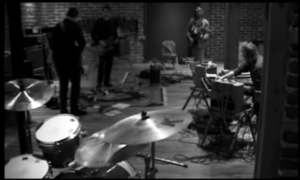
In 1998 Wouter joined Dead Man Ray as a producer and -for the first time in 15 years – as a band member. Wouter also mixed all albums, except for Cago. Dead Man Ray was a high octane mix of artistic talent and diverging characters and backgrounds. It lasted for 3 albums and several tours with some electric live performances. The band featured singer Daan Stuyven before his solo-career took off, ex-dEUS Rudy Trouvé on (left handed) guitar, guitar player Elko Blijweerdt and drummer Herman Houbrechts. They ended up recording their third album “Cago” in Chicago with Steve Albini, but being part of a high maintenance cult band took its toll, and members went their own way while the band was put on ‘non-active’.
1998 Becoming independent with a ‘Welgemeende (fuck you)’
“After 10 years as a producer, you should be able to say: ‘Fuck you’”. Wouter not only remembered these words of senior producer Roland Verlooven, but by now also felt them for himself: producing will eat the producer in time, and one should be able to buy the freedom to choose one’s productions. It’s the freedom to say ‘no’ to some, but also the power to say ‘yes’ to others, when it comes to releasing and promoting artists, for which Wouter had been depending on the Majors all these years. Earlier Wouter had joined the A&R department of Warner Music for 2 years, where he had signed Zita Swoon and An Pierlé, and produced the debut album of Novastar with Marc Bonne. Novastar’s debut album enjoyed major success in both Holland and Belgium. But it was time for Wouter to become fully independent.
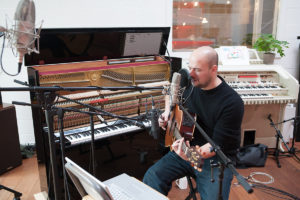
Almost 10 years after starting his own publishing company Powertone, Wouter founded the Petrol Music label for which he was to be the A&R. He would soon be joined by Werner Dewachter as label manager. The label headed off with another successful solo-debut produced by Wouter. Rapper/singer Flip Kowlier’s (t’Hof van Commerce) ‘Ocharme Ik’ would immediately generate for Petrol Music the necessary financial reserves to invest. As it happened, the album featured the hit single ‘Welgemeende (fuck you)’ – which translates more or less as ‘Fuck you, and I really mean it’. It also featured another classic to be, “Min Moaten”.
The Vanbelle-Petrol-Kowlier combination consolidated itself with the follow-up album In de Fik, selling over 40,000 copies in Flanders, just like the debut album. Both were co-productions with Peter Obbels. Petrol Music broadened its foothold releasing the song Sadness from the then unknown band Stash, breaking several records with its longevity as a chart topper.
Following a tip from Rudy Trouvé, Wouter ended up a concert of an unknown band called Yevgueni, playing to a full house of students. He liked what he heard: an instantly recognizable voice, good lyrics, a solid band and melodies that stuck. He signed them to Petrol and produced their debut album, taking the risk of inflating the budget by adding sessions with the London Chamber Orchestra. The risk was that Yevgueni’s music was generally considered unfashionable: they make ‘kleinkunst’ -song based folkmusic- which is still pretty much a niche-genre, considered obsolete by prime-time radio. But Wouter had grown up with singers such as Boudewijn de Groot and Jules Decorte, and their arrangements by the Belgian Bert Paige, and so he wanted to take the risk to invest in Yevgueni’s debut Kannibaal. Time proved him right. Appearing 4 years after their debut, Yevgueni’s third album We Zijn Hier Nu Toch would become a surprise chart topper.
Petrol Music continued its successes with the Stash full album Blue Lanes, Yevgueni’s second album -Aan De Arbeid- and Flip Kowlier’s third collaboration with Wouter, the reggae album Otoradio. It features yet another classic song, Mo Ba Nin with a notable Hammond solo by Wouter.
While expanding into the music business, Wouter felt like sizing down his personal studio in 1999, to living room size in a small house in Haacht. In 2002 Wouter switched to 32 bit with ProTools HD, while still combining digital recording with analog devices such as the 8-track Studer.
2005 Wow & Flutter, a double solo debut
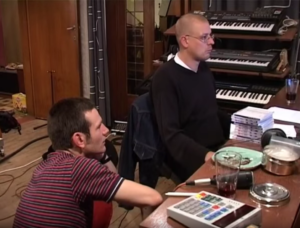
Reflecting upon his burn-out as a producer, Wouter finally began to focus on his own work. And for once, Wouter wouldn’t select the songs for the album. He entrusted this job to co-producer Peter Obbels, who went through 25 CD’s with 30 years worth of improvisations and demos.
In 1998 a first compilation of early recordings was made: 11 CDs filled with an array of snippets, experiments and compositions recorded on a wide variety of locations (touring as a front-of-house engineer) and studios while producing, arranging and mixing other artists albums.
Wouter: “A second box with older tape recordings was opened, containing early tape echo, ping-pong and synthesizer-experiments, and anything from childhood piano playing to the Phillicorda organ I played in a rockband. We went from 11 to 22 compilation CDs. Peter made a selection of material to work on. Then, by (re)writing, jamming and playing with drummer Karel De Backer and Elko Blijweert on guitar, compiling and editing, I finally ended up with compositions and songs. I asked partner in crime for years Marc Bonne to join on drums and to co-produce the album with Peter Obbels. We all took our time to make the best sound possible.
As a kid I was kind of addicted to the orchestral work of Andrew Powell with Cockney Rebel, Kate Bush, Pilot, Alan Parsons Project … so in 2002 I sent him my work in progress.
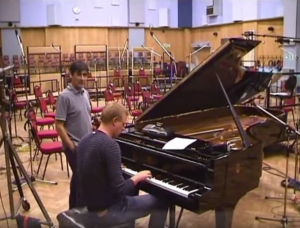
I feel honoured that he connected to my music, accepted to write the arrangements and introduced me to both Jon Kelly -who mixed the album- and The London Chamber Orchestra (LCO), and that’s how I finished my album in London. The final result is what I was dreaming of.”
Part of Wow & Flutter got mixed on the David Gilmore’s boat studio Astoria on the Thames. The double album also marked the start of Wouter’s collaboration with arranger Andrew Powell, with whom he later also worked on the Laïs’ album Douce Victim, and on albums from Yevgueni and Racoon.
In 2006 it was time for Powertone studio to move and change size once more, from a living room to an entire building built around a new studio. New kid on the block Arno Lievens became the right hand man for the years to come.
In 2011, after 25 years the Soundcraft 1600 finally got replaced as a main mixing console, by the Focusrite Studio Console NR0007.
2011 Dutch success with Racoon
Approached by the Racoon management, Wouter took on the challenge of producing a formerly successful band that hadn’t scored a hit in years. Wouter stuck to his production system. After selecting 13 out of 60 demo songs, he asked the band to rerecord them on multitrack. These new demos then got the typical treatment: together with programmer and long time collaborator Yannic Fonderie, Wouter partially restructured, rearranged and transposed the songs till they became a blueprint for the album. Racoon approved of the blueprint and started rehearsing for the recording at Powertone Studios. After satisfying recording sessions, Racoon’s management gave green light for additional recordings with the London Chamber Orchestra at Abbey Road Studios, arranged by Andrew Powell. Some of the live vocal takes from those London sessions made it onto the album.
With the success of Liverpool Rain, Racoon became Holland’s biggest indie pop band, raking up music prizes. The album has been featuring now for two years in the Album Top 100, becoming their “Dark side of the Moon”.
The same year Wouter produced, mixed and played on Flip Kowlier’s Geboren Voe te Leven, a Flemish language version of the 1979 disco classic “Born to be alive” (Patrick Hernandez) for the soundtrack of “Het Varken Van Madonna”, a feature film by Frank Van Passel
2012 Winther and Oceaan
Wouter Produced and mixed the debut album Winther. ”Winther is without doubt one of the best debut albums ever released in Belgium. It was live recorded in studio and given a warm sound by Producer Wouter Van Belle.” (Willem Jongeneelen, OOR #12, 2012)
Wouter produced the one-off Dutch language song “Oceaan” for Racoon, written for the soundtrack of Alles is Familie. The song was recorded in one take live in London, in Mark Knopler’s British Grove studio, string arrangement by Andrew Powell.
2013 – 2014 Flip Kowlier + Delrue
Wouter produced, mixed and played on the album Cirque – De Avonturen Van W.M. Warlop. A conceptalbum by Flip Kowlier with songs adopting the viewpoint of several artists after the demise of their circus show. Wouter recorded the City of Cambridge Brass Band and the London Chamber Orchestra in Abbey Road Studios, with string arrangements by Andrew Powell.
Wouter produced arranged and mixed the album Risquons Tout, the French language solo debut of (Klaas) Delrue, singer of the popular Belgian band Yevgueni. Orchestral arrangements by Andrew Powell.
2015 – 2016 Racoon + Helmut Lotti
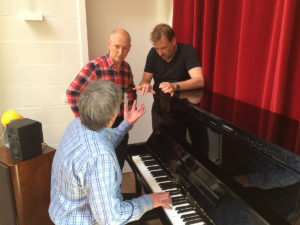
Wouter worked again with Racoon for the follow up of Liverpool Rain. All In Good Time tops the album charts in Holland, with production, mix and arrangements of Wouter and again with Andrew Powell for the orchestral arrangements.
Wouter produced the cult album Faith, Hope and Love, which was remixed and later on released worldwide (Germany, Austria, Switzerland, South-Africa, Scandinivia) as Helmut’s come back album. Andrew Powell wrote the orchestral arrangements.
2018 Dead Man Ray + Geike
Fall 2018, Dead Man Ray released an EP, with 4 new recordings, mixed by Wouter. The single “Out” put Dead Man Ray back in the spotlights and on stage.
Wouter produced, arranged and mixed Geike’s second solo-album Lost in Time. Most of the songs are written by Joost Zwegers (Novastar)
2019-2020 Florejan + Mevy
Wouter mixes the Dead Man Ray album Over.
Wouter produces two debut albums with the artist: Florejan’s Piano Piano and Mevy’s Spectrum.